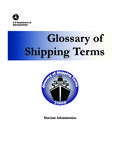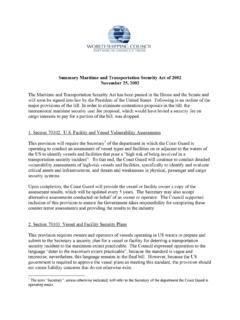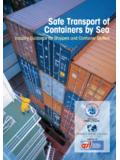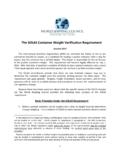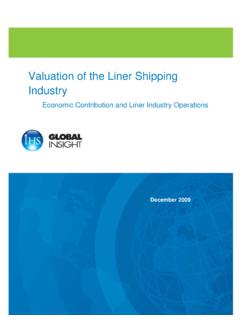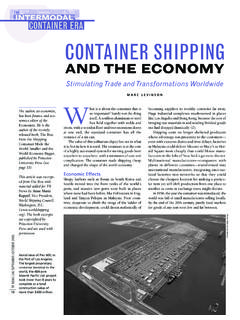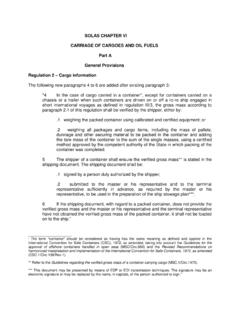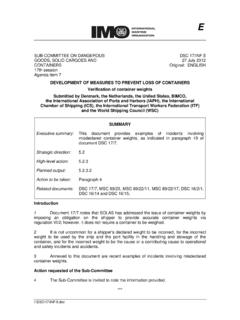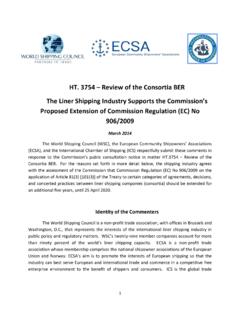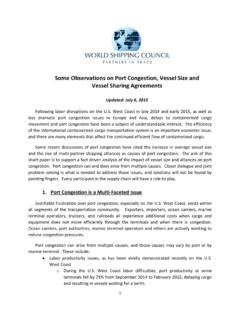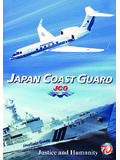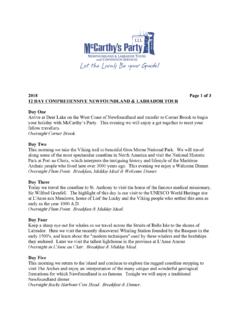Transcription of Comments of the World Shipping Council Before …
1 Comments of the World Shipping Council Before the united States Customs Service _____ In the Matter of Advance Cargo Manifest Filing Proposed Rulemaking For Vessels Loading Cargo at Foreign Ports for Transport to the united States Proposed Changes to 19 Parts 4 and 113 _____ September 9, 2002 I. Introduction The World Shipping Council (the Council ) is a non-profit trade association of over forty international ocean carriers, established to address public policy issues of interest and importance to the international liner Shipping industry. The Council s members include the leading ocean liner companies from around the World -- carriers providing efficient, reliable, and low-cost ocean transportation for America s international trade.
2 The members of the World Shipping Council are major participants in an industry that has invested over $150 billion in the vessels, equipment, and marine terminals that are in worldwide operation today. Today, over 800 ocean-going liner vessels, mostly containerships, make more than 22,000 calls at ports in the united States each year -- more than 60 vessel calls a day. The industry generates over a million American jobs and over $38 billion of wages to American workers. The industry provides the knowledge and expertise that built, maintains, and continually expands a global transportation network that provides seamless door-to-door delivery service for almost any commodity moving in America s foreign commerce.
3 The Council s member lines1 include the full spectrum of carriers from large global lines to niche carriers, offering container, roll on-roll off, and car carrier service as well as a broad array of logistics services. The members of the Council have worked closely with the government and the Customs Service to address the need for enhanced security of international maritime commerce. International liner Shipping companies have provided nearly unanimous support for Customs Trade Partnership Against Terrorism (C-TPAT), supported research initiatives such as Operation Safe Commerce, supported the government s efforts at the International Maritime Organization to develop new security standards for ships and marine terminal operations, supported the Customs Service s Container Security Initiative to establish enhanced screening and inspection capabilities at ports around the World , and supported maritime security legislation Before the Congress.
4 The industry has done so recognizing the importance of securing America s trade and World trade from the threat of terrorist attack. The World Shipping Council s comments2 on this proposed rulemaking are made in a continued spirit of commitment to address these challenges with measures that are both meaningful and effective, and which continue to preserve the immense benefits that the American economy, American businesses and American consumers receive from the free and efficient flow of international commerce. The united States is the largest trading nation in the World for both exports and imports, accounting for roughly 20 percent of the World trade in goods. The free flow of international trade is crucial to the smooth functioning of our national economy.
5 In 2001, America imported more than $ trillion in goods, of which capital goods, consumer 1 A list of the World Shipping Council s member companies is provided as Attachment A. 2 These Comments were developed with the assistance and input of member lines representatives on the Customs Electronic Systems Action Committee (CESAC). 2goods, and industrial supplies and materials made up 26%, 25% and 24% of that total Exports support an estimated one in five manufacturing jobs, and agricultural exports account for about 25 percent of American farmers gross cash sales. Indeed, one in every three acres is planted for Much of that vital international trade moves by sea.
6 In 2001, America s ocean-borne commerce amounted to more than $719 billion. Approximately $490 billion of that commerce moved into and out of ports in containers roughly million TEUS of import cargo (valued at over $345 billion), and another million TEUs of export cargo (valued at over $143 billion). The international ocean transportation system that moves those exports and imports is an integral part of the network of product supply chains that links American importers and exporters with overseas customers and suppliers, intermediate and final manufacturers, domestic carriers, distributors, and retail outlets. The Council appreciates and supports the efforts by the federal government to enhance protection of this infrastructure, not only in order to protect lives and property, but to protect the economic vitality of America and its trading partners.
7 It is difficult to quantify the magnitude of the costs much of it in reductions in economic activity that a shutdown of container seaports as a result of terrorism would produce. Nevertheless, a recent, detailed study of the potential impact of a shutdown of West Coast container ports, estimated that the likely costs of port closures, just on the West Coast, would cause a reduction in GNP of $ billion after five days, $ billion after ten days, and $ billion after 20 days. And, these numbers don t begin to assess the impact in other countries economies. Obviously, the consequences could be very substantial. Our Comments recognize the need both to protect this trade and to allow it to continue to operate efficiently and reliably.
8 Our Comments also address the reality that this proposed rulemaking is the single most substantial proposed change to how America s international maritime commerce would be conducted since September 11. Its ramifications will affect virtually every shipper, every importer, every port, every marine terminal operator, every transportation intermediary, every bank financing American international trade, and every maritime carrier involved in the transportation of goods by sea to the united States. It will affect the Customs Service, its operating systems and capabilities, and its staffing. It will affect the cost and speed of international commerce. The principles and issues involved are substantial and numerous.
9 The agency s objective cannot be achieved unless both the affected commercial parties and the agency itself are fully prepared to implement such a new regime. 3 Trade in 2001, at (see Annex 1). See also, Census ( ), Foreign Trade Division, Exports and Imports of Goods by Principal End Use Category. 4 Robert B. Zoellick, Trade Representative, in a speech to the Council of Foreign Relations, on October 30, 2001. Pages 5-6. While these proposed regulations apply only to inbound cargo manifests, or imports, it is important to recognize that reciprocity is an important part of the international movement of goods. exports could be subjected to the same kinds of rules by foreign governments as the Customs Service is proposing for imports.
10 Ensuring a careful, successful implementation of this proposal could have positive consequences from the perspective of our trading partners governments, and thus on how they may treat exports. 3 With full support for the efforts of the and other governments to establish enhanced security while ensuring the efficient flow of commerce, we offer the following Comments to this proceeding. II. Cargo Manifests: General Today a cargo manifest is the document that states what a carrier has loaded aboard a vessel for delivery to the united States. The creation, submission, and retention on board of the manifest are tasks that are the responsibility of the vessel carrier and are regulated by law and regulations. Proper manifesting is a requirement for allowing the entry of inbound vessels and for the issuance of a permit to unlade.
